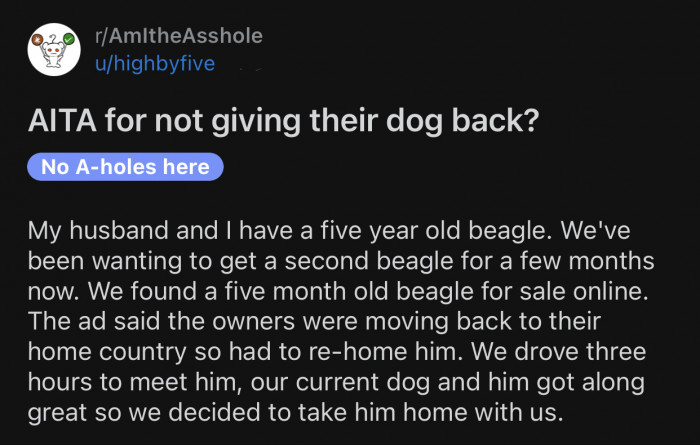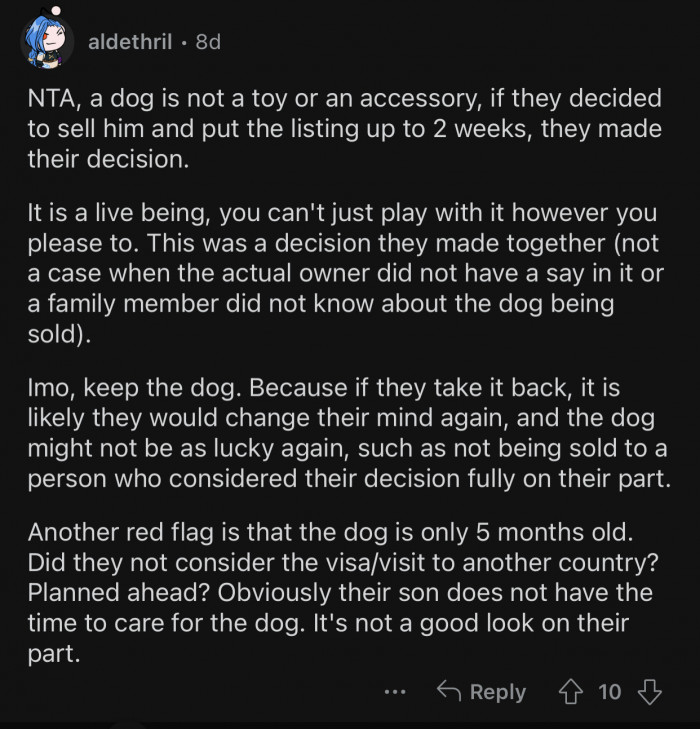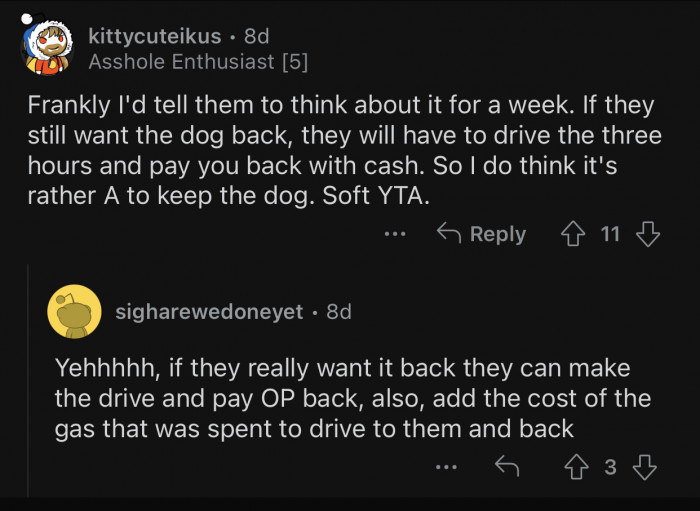Redditor Refuses To Return Dog Back To Its Original Owners Who Got A Bad Case Of Seller Remorse
Being forced to part ways with your pet is a complex situation to deal with. Sometimes life gets in the way, and it's no longer possible to keep your pet, which is something no pet owner would ever want to face. According to Dr. Alexandra Solomon, a relationship expert, "The emotional bond we form with our pets is profound, and letting go can trigger feelings of guilt and sadness." Rehoming your dog and ensuring that he will be cared for and loved by another family is always the right thing to do. You want to make sure that your pet is going to be in good hands and loved the same way he has always been. Second-guessing your decision at the last minute is quite normal since it's a heartbreaking and emotional moment that will make you reconsider many things. But once you give your pet away, sometimes there's no going back, and you will lose your pet forever. A Redditor who goes by the username u/highbyfive made a post on the r/AmItheA**hole subreddit, where she explained how she refused to give a family their dog back after driving three hours to buy him. The user received a lot of different and interesting reactions to her post.
Here’s the original post by Reddit user u/highbyfive:

The family of OP’s newly adopted dog planned to leave the country for six months and decided to give their dog away.

Soon after that, the owners’ son called OP to see if they could get their dog back.

The Emotional Attachment to Pets
The bond between humans and pets is profound, often comparable to familial connections.
According to Dr. Dan Gilbert, a happiness researcher, "The love we feel for our pets can mirror the deep emotional connections we have with family members, providing a sense of belonging and joy." Pets can fulfill emotional needs like companionship and love, which may not be met elsewhere. When a pet is perceived as part of the family, returning it can evoke intense feelings of loss and betrayal, similar to those experienced in human relationships, as noted by Dr. Madeline Levine, a child psychologist, who states, "The emotional turmoil of losing a pet can be akin to the grief experienced in human relationships."
Understanding Attachment and Belonging
The emotional bond between pets and their owners can resemble familial attachments, providing comfort and security. Research in attachment theory, particularly by Dr. Mary Ainsworth, emphasizes that strong attachments can significantly impact an individual's sense of belonging and emotional health. For many, pets fill a crucial emotional void, leading to feelings of loyalty and connection that are hard to relinquish.
In this context, the decision to retain a pet from prior owners can be viewed through the lens of attachment style. It’s important to recognize that pets often become integral members of a family, and the emotional upheaval caused by separation can be profound for all parties involved.
OP decided to keep the dog and not return it.

OP modified the post to include an Edit with more context.

Here’s how the Reddit community reacted to u/highbyfive's post:

This situation raises important questions about ownership and responsibility in pet adoption.
According to studies in animal behavior, the decision to adopt a pet should involve thorough consideration of the emotional and practical commitments required.
In fact, transitioning a pet to a new home can be stressful for the animal, warranting a thoughtful approach to such decisions.
Moreover, the concept of 'seller's remorse' illustrates how emotional attachments can complicate decision-making. When individuals feel regret over a choice, it often stems from an emotional conflict between their desires and societal expectations. Studies show that this internal conflict can lead to significant distress, prompting individuals to cling to what they've lost, even if it may not be in their best interest.
To navigate these emotional waters, it could be beneficial for the original owners to engage in open dialogue with the new pet owners. Establishing a framework for discussion can facilitate understanding and acknowledgment of each party's feelings, which is crucial in resolving the emotional complexities that arise from such situations.
After only a few days, it would be better to give the dog back.

They should have thought their decision through before involving other people.

It wasn’t a last-minute decision for the owners.

Understanding Seller's Remorse
Seller's remorse, as seen in this scenario, can stem from the emotional bonds that develop unexpectedly during the rehoming process.
Research from behavioral economics reveals that once an individual invests emotionally in a decision, it becomes harder to detach from it, leading to regret.
This phenomenon is particularly pronounced in relationships with pets, as they often represent unconditional love and loyalty.
The Role of Empathy in Rehoming Pets
Empathy plays a vital role in resolving conflicts surrounding pet ownership. Research from social psychology indicates that cultivating empathy can lead to more compassionate decision-making. By understanding the emotional landscape of both the pet and the owners involved, individuals can better navigate their feelings and actions in a way that respects everyone’s needs.
Practicing active listening and validating each person's feelings can create a more supportive environment. This not only helps in making decisions that are considerate of all parties involved but also fosters emotional healing, enabling each individual to process their loss or change more effectively.
Leo is better off with a more stable family.

It would be kind of OP to give the family their dog back, but they don’t have to.

Loving dogs don't come from abusive homes.

For those in similar situations, it may be beneficial to establish clear agreements before pet adoption to manage expectations on both sides.
Engaging in open discussions about the responsibilities and emotional implications of pet ownership can foster greater understanding and reduce conflicts.
Additionally, the inclusion of trial periods for pet adoption can help families assess their readiness for such a commitment and mitigate feelings of remorse.
Behavioral experts suggest developing a structured plan for transitioning the pet, which may include gradual visits or temporary arrangements to help the original owners adjust. This kind of thoughtful approach can lessen the emotional impact of separation and facilitate a smoother transition.
Furthermore, establishing a support system for individuals involved—whether through family, friends, or pet support groups—can provide necessary emotional reinforcement during this challenging time. Encouraging open communication and shared experiences can enhance overall understanding and compassion.
The family should have been clearer from the beginning.

The family made their decision and received payment for their dog.

OP should have given the family more time to think.

The Role of Empathy in Rehoming Pets
Empathy plays a crucial role in how individuals respond to situations involving pets.
Studies show that empathy enhances our understanding of others’ feelings, leading to more compassionate decisions.
In this case, recognizing the emotional turmoil of both the original owners and the new caregivers can lead to more supportive and cooperative resolutions.
OP can never know if the family will do it again.

It's their dog after all, and they have the right to feel remorseful.

OP fairly paid for the dog, then refused to give it back.

When faced with dilemmas involving pets, individuals can benefit from seeking support from professionals or animal welfare organizations.
These resources often provide guidance on responsible pet ownership and strategies for coping with difficult decisions.
Additionally, fostering community discussions about pet care can help build networks of support for those navigating similar challenges.
OP should return the dog to their owners and get a different one.

The dog won't remember them after six months.

That's not a life for a dog.

Well, this was an interesting story. OP should have waited a little longer and given the family a bit more time to rethink their decision.
It's their dog after all, but OP paid for it and could not return it; it's just the right thing to do. If you enjoyed reading this, be sure to check out similar content on our platform.
Psychological Analysis
This scenario illustrates the emotional turmoil that can arise when attachments to pets are challenged. The strong bond individuals form with their pets often leads to heightened feelings of loss when faced with rehoming. Encouraging empathy and open dialogue between all parties can facilitate a more supportive resolution.
Analysis generated by AI
Analysis & Alternative Approaches
Insights from attachment theory and emotional psychology underscore the complexities involved when pets are rehomed. Research consistently highlights that strong emotional bonds can complicate rational decision-making, emphasizing the need for empathy and understanding in these situations.
Ultimately, fostering open communication and emotional support is key to helping all parties involved navigate their feelings, leading to healthier resolutions and emotional well-being.
Analysis & Alternative Approaches
The emotional complexities surrounding pet ownership require careful navigation and understanding.
Research indicates that empathy and open communication are key to resolving conflicts effectively.
By prioritizing these elements, individuals can create a more harmonious environment for both pets and their families.



